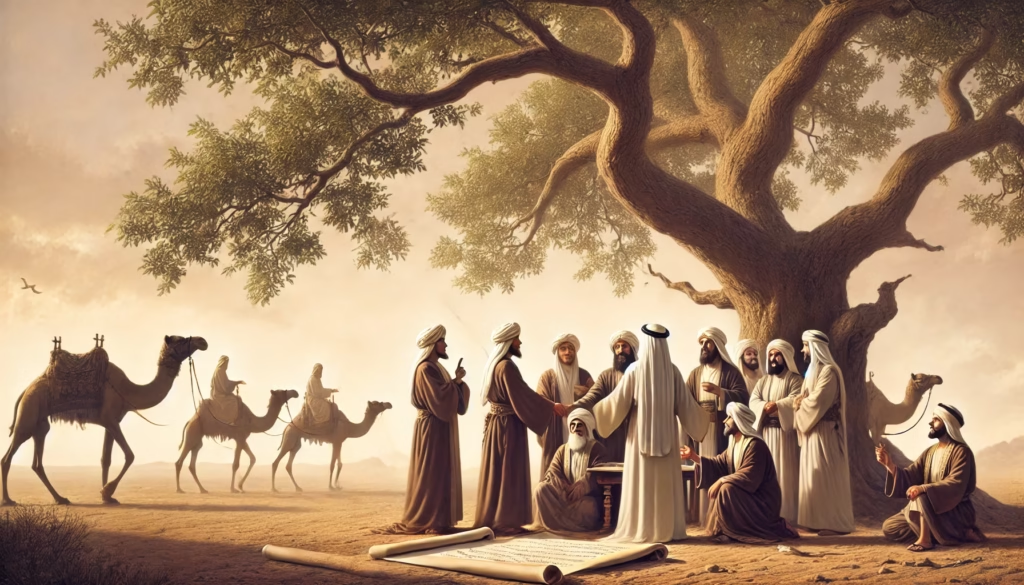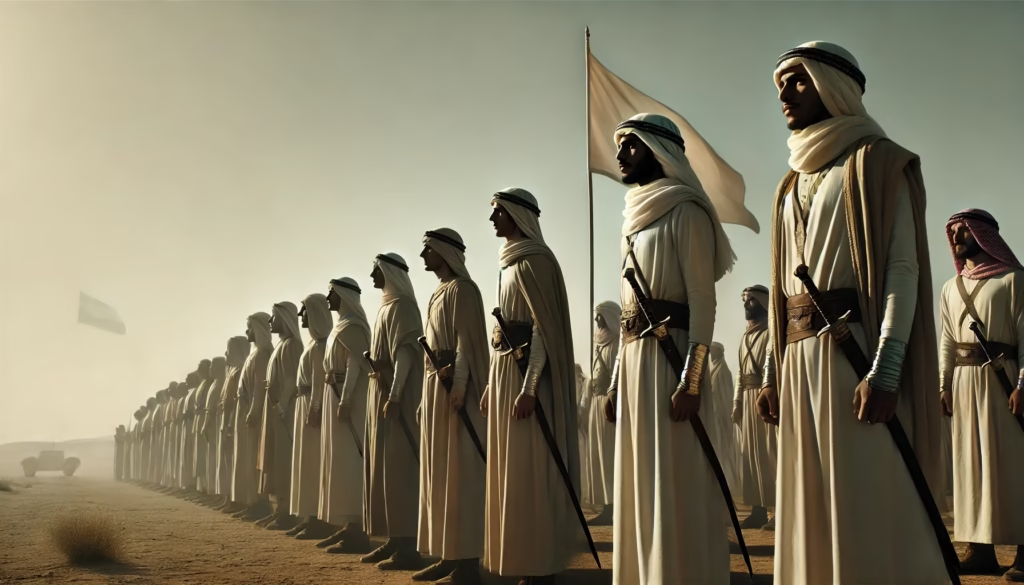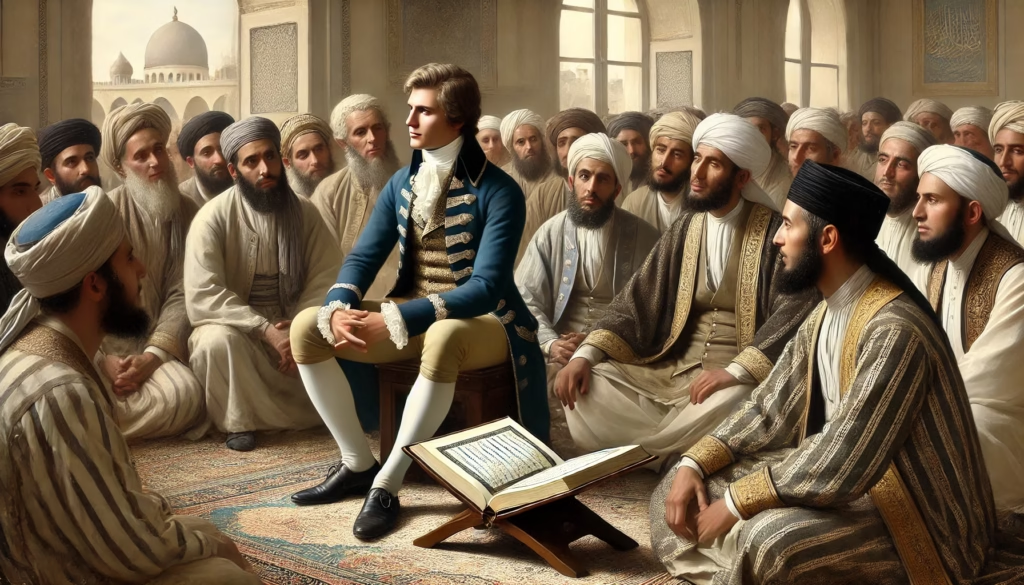Table of Contents
Introduction
This is the sixth installment in the series titled “In the Brightened Corridors of the Prophet’s Life Story“. This article explores the concept of leadership aura, its significance, how the companions recognized and expressed it towards the Prophet (Peace be upon Him), and how He, in turn, accepted and responded to their gestures. Click here to read the full series, ALLAH willing.
The Leadership Aura of the Prophet (PbuH): A Test of Dignity During the Treaty of Hudaybiyyah
This article delves into a significant topic: the concept of leadership aura. A leader must embody dignity and have that dignity recognized by others; without this, their authority cannot be firmly established among the people. Although this theme runs deeply through the Prophet’s biography, it is a subject that often goes unnoticed or underappreciated.
An example of this can be seen during the Treaty of Hudaybiyyah. Urwah ibn Masud al-Thaqafi, acting as Quraysh’s ambassador, approached the Prophet (Peace be upon Him) with the assertive and threatening demeanor typical of an envoy.
He began by saying, “Have you ever heard of anyone amongst the Arabs extirpating his relatives before you? On the other hand, if the reverse should happen, (nobody will aid you, for) by ALLAH, I do not see (with you) dignified people, but people from various tribes who would run away leaving you alone”1. By this, he referred to the diversity of the Prophet’s companions, who came from different tribes—some from Mecca, others from Medinah, and various other regions. This diversity was a result of migration, which became obligatory after the establishment of the Islamic state. Many who embraced Islam from different tribes joined the Prophet (Peace be upon Him) after migrating.
Urwah continued, saying, “And here is Quraysh, who has donned the skins of tigers for you”2, implying that Quraysh had resolved to go to war, while those with the Prophet (Peace be upon Him) were nothing more than a disparate group.

At this moment, Abu Bakr al-Siddiq, known for his gentle and compassionate nature, broke his characteristic calm and uttered explosive words: “Suck the clitoris of Al-Lat! Do you say we would run and leave the Messenger of ALLAH (Peace be upon Him) alone?“3 This uncharacteristic outburst was the only known instance of Abu Bakr cursing someone in this manner. It stemmed from his immediate recognition that Urwah’s words threatened to undermine the Prophet’s dignity and His leadership aura.
The Unparalleled Devotion of the Prophet’s Companions
A masked warrior stood vigilantly beside the Prophet (Peace be upon Him), gripping the handle of his sword. Each time Urwah ibn Masud stretched his hand toward the Prophet’s beard while speaking, the warrior firmly hit Urwah’s hand with the handle of the sword, warning, “Keep your hand away from the Messenger of ALLAH’s beard, or it may not return to you“4. This masked figure was none other than Al-Mughirah ibn Shu’bah al-Thaqafi, who was, remarkably, the nephew of Urwah ibn Masud himself.
When Urwah returned to Quraysh, he addressed them, saying,
“O people! By ALLAH, I have been to the kings and to Caesar, Khosrau and An-Najashi, yet I have never seen any of them respected by his courtiers as much as Muhammad is respected by His companions” 5
He vividly described the profound attachment and unwavering respect the Prophet’s companions had for Him, adding,
“They would never surrender Him”6
Urwah’s observation was clear: engaging in war against such a Leader (Peace be upon Him) and His unified followers would be a doomed effort. Their devotion to their Leader (Peace be upon Him) and their unity made it nearly impossible to reach or defeat Him.
The Leadership Aura of the Prophet (PbuH): Reverence and Defense
The Prophet (Peace be upon Him), with His impeccable character and qualities, naturally exuded a profound leadership aura. Amr ibn Al-As once remarked,
“If I were asked to describe the Messenger of ALLAH, I could not do it because I never filled my eyes with looking at Him out of reverence for Him“7
This statement reflects the balance of intense love and deep reverence the companions had for Him, to the point that they found it difficult to gaze directly at Him out of awe.
The companions also understood that this leadership aura needed to be visibly upheld in front of others. For this reason, Umar ibn Al-Khattab, may ALLAH be pleased with him, was often heard saying, “Allow me to chop his neck off, O Messenger of ALLAH!” Whenever someone showed disrespect toward the Prophet (Peace be upon Him), Umar or other companions would immediately offer to defend His dignity, though such offers were most frequently recorded from Umar.
An instance of this occurred when Dhul-Khuwaysirah al-Tameemi, the forerunner of the Kharijites, insolently said to the Prophet (Peace be upon Him), “O Muhammad, be just, Act justly”. The Prophet (Peace be upon Him) responded firmly, “Woe to you! Who else would act justly if I did not act justly?” At this, Umar interjected, “O Allah’s Messenger! Allow me to chop his neck off“. However, the Prophet (Peace be upon Him), in His wisdom and patience, replied, “Leave him“8, and then went on to mention the hadith concerning the Kharijites.
Defending the Prophet’s Leadership Aura: The Companions’ Loyalty and the Prophet’s Wisdom
Another instance occurred when Hatib ibn Abi Balta’ah, may ALLAH be pleased with him, made a grave mistake during the preparations for the conquest of Mecca. He secretly corresponded with the people of Mecca about the Prophet’s (Peace be upon Him) plans. However, the news was revealed through divine intervention, and the letter he had sent to Quraysh was intercepted. In response, Umar said, “Allow me to chop his neck off, O Messenger of ALLAH, for he has become a hypocrite“9.
A similar incident took place when Abdullah ibn Ubay ibn Salul, the leader of the hypocrites, insolently remarked,
“If we return to al-Madīnah, the more honored [for power] will surely expel therefrom the more humble“10
(Suraat ‘Al-Munafiquun, 63:8)
Again, Umar immediately offered, “Allow me to chop his neck off, O Messenger of ALLAH“.

These examples highlight the companions’ eagerness to defend the Prophet (Peace be upon Him) and His leadership aura whenever it was challenged. Importantly, it was the Prophet (Peace be upon Him) Himself who restrained them in these moments. If such actions were unnecessary or displeasing to Him, He (Peace be upon Him) would have outright prohibited them. Yet, the Prophet (Peace be upon Him) never forbade Umar or others from making such offers, because maintaining the dignity and authority of a leader is crucial. Without it, order would collapse, and even the most despicable individuals would feel emboldened to show disrespect.
Rivalry in Devotion: Aws and Khazraj’s Unwavering Defense of the Prophet
Ibn Hisham narrates in the Seerah that the devotion and rivalry between the Aws and Khazraj in honoring and defending the Prophet (Peace be upon Him) were extraordinary. He described their actions, saying,
“These two tribes, Aws and Khazraj, would compete over the Messenger of ALLAH like two stallions. If the Aws did something beneficial for the Messenger of ALLAH, the Khazraj would say, ‘By ALLAH, you will not surpass us in excellence toward the Messenger of ALLAH and in Islam’. They would then strive until they achieved something similar”.
This spirit of competition is evident in their responses to those who harmed the Prophet (Peace be upon Him). For instance, when Ka’b ibn Al-Ashraf insulted the Prophet (Peace be upon Him) and was subsequently killed by members of the Aws, including Muhammad ibn Maslamah, may ALLAH be pleased with him, the Khazraj sought an opportunity to demonstrate their equal devotion. They identified Salam ibn Abi Al-Huqayq, a prominent enemy of Islam and a conspirator against the Prophet (Peace be upon Him), who resided in Khaybar. The Khazraj sought the Prophet’s (Peace be upon Him) permission to eliminate him, and upon receiving His approval, they carried out the mission and killed him.
The Importance of Leadership Aura in Preserving the Dignity of Islam and Its Messenger (PbuH)
The concept of ‘leadership aura‘ is vital, as emphasized by Ibn Taymiyyah in his renowned book, The Drawn Sword Against Those Who Insult the Prophet. Addressing concerns about whether the ruling of executing those who insult the Prophet (Peace be upon Him) might deter some disbelievers from embracing Islam, he stated:
“A single word of insulting the Prophet (Peace be upon Him) cannot be tolerated in exchange for thousands of disbelievers accepting Islam. For ALLAH’s religion to be upheld in a way that prevents anyone from speaking ill of it is more beloved to ALLAH and HIS Messenger than for people to enter it while it is violated and belittled”
Ibn Taymiyyah was discussing cases where individuals, such as people from Ahl al-Dhimmah or hypocrites, insulted the Prophet (Peace be upon Him) under various pretenses—sometimes claiming ignorance or even declaring their Islam afterward. He regarded this as a form of hypocrisy that cannot be accepted, as it undermines the respect and dignity due to the Prophet (Peace be upon Him).
The key takeaway is Ibn Taymiyyah’s profound understanding of the necessity of reverence and respect for Islam and its Messenger (Peace be upon Him). He argued that preserving the dignity of the religion is far more critical than gaining numbers of followers at the expense of its sanctity. This principle is reflected even in the actions of those outside the fold of Islam.

For example, Napoleon Bonaparte, one of history’s most prominent figures, sought to win over Muslims during his occupation of Egypt. He went so far as to publicly declare his Islam, claim greater reverence for the Prophet (Peace be upon Him) than the Mamluks, and even listen to the Quran with apparent emotion. What drove such behavior? It was the unyielding dignity and respect Muslims had consistently preserved for their Prophet (Peace be upon Him), both during His lifetime and after His passing.
There are many such stories, which we may address in another context. May ALLAH, the Blessed and Exalted, teach us what benefits us, grant us benefit through what HE has taught us, and increase us in knowledge.
Sources:
- Mohamed Elhamy. محمد إلهامي | في أروقة السيرة | 6. هيبة القائد. YouTube Video.

